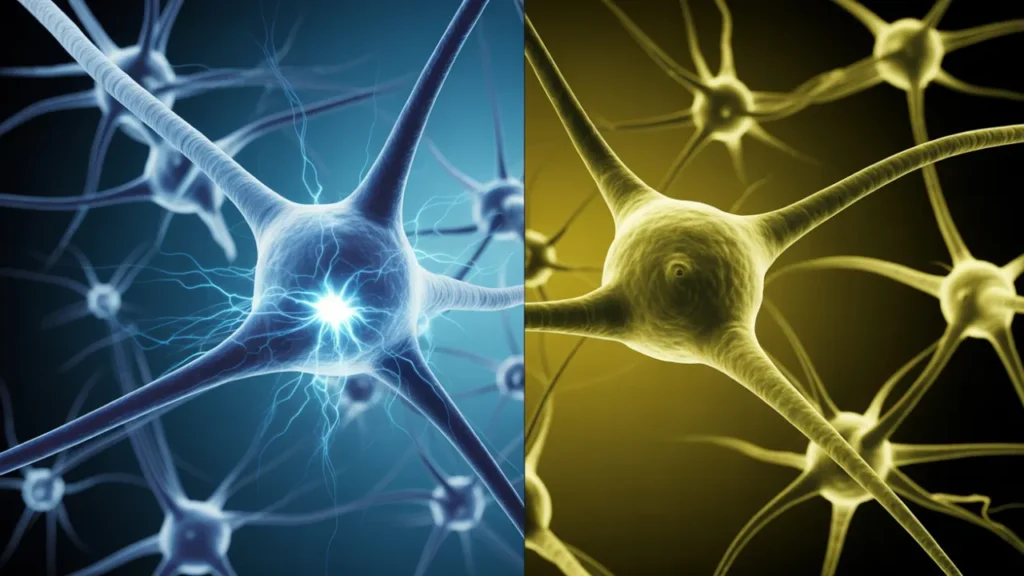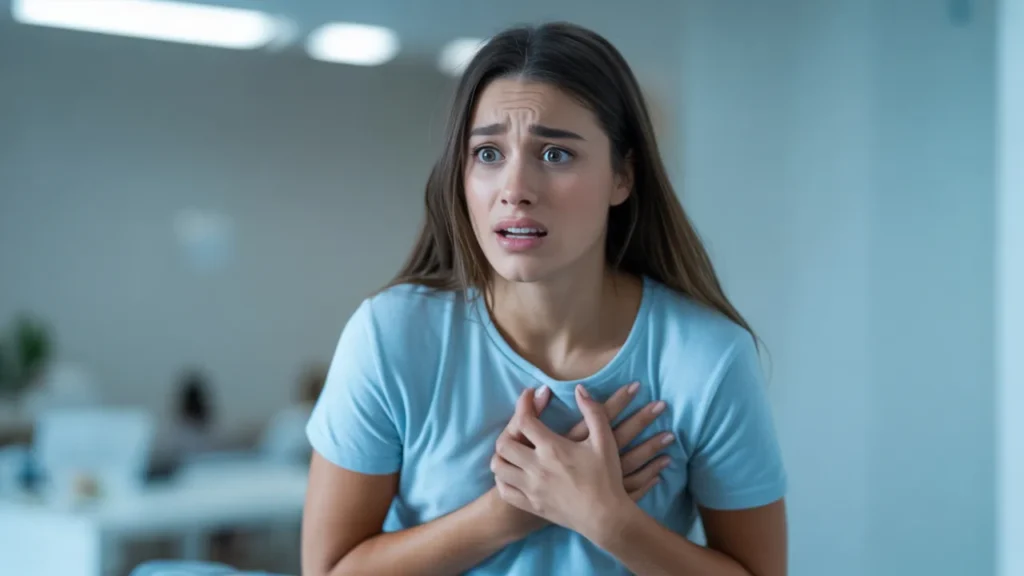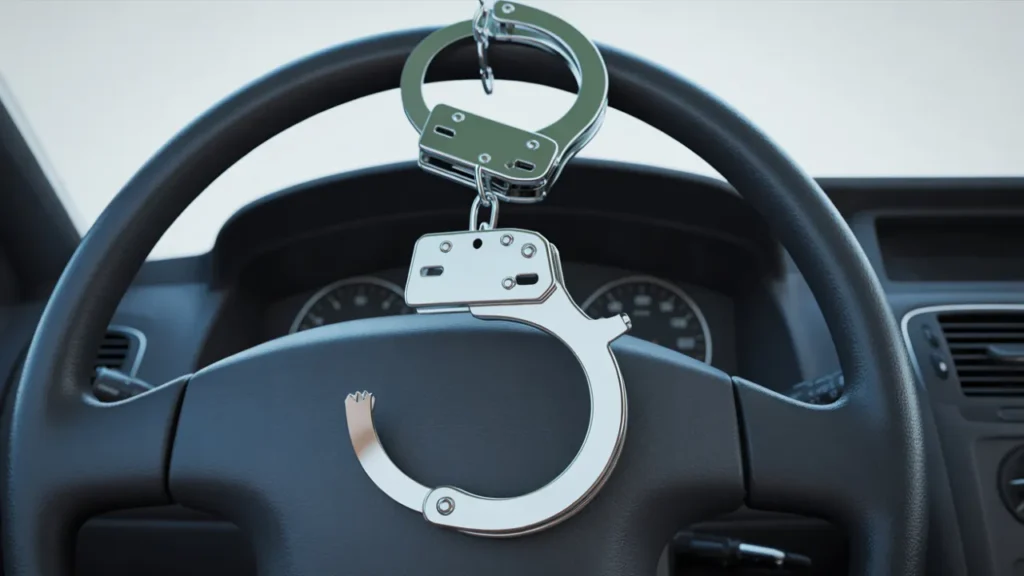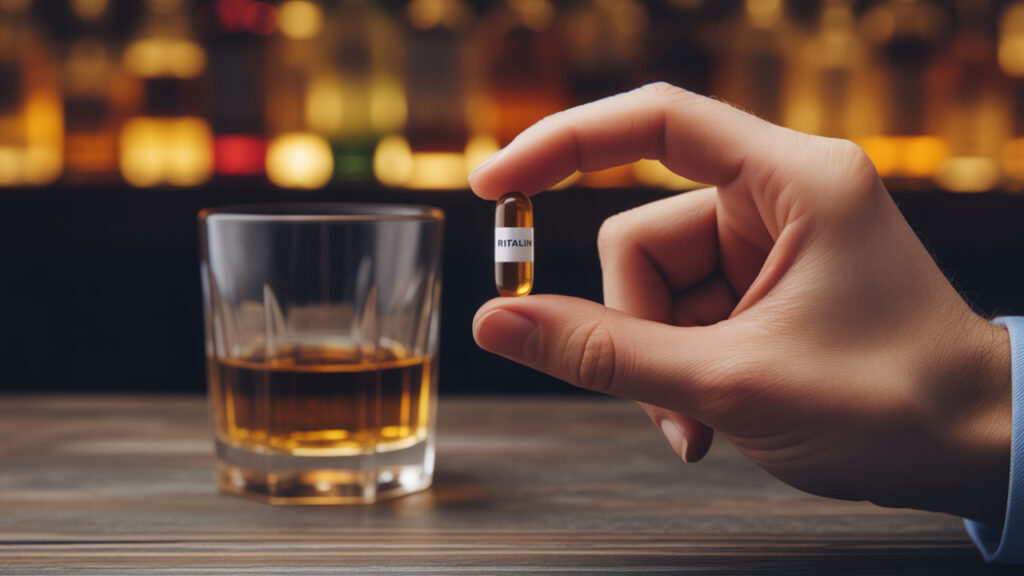Ritalin And Alcohol: What This Mix Really Does
Ritalin (methylphenidate) is a stimulant, and alcohol is a depressant. Mixing them can confuse the central nervous system and hide impairment. This raises risk for injury, poor judgement, and medical emergencies.

How This Pair Affects The Brain And Nervous System
Methylphenidate increases dopamine and norepinephrine, which lift attention and alertness. Alcohol slows the nervous system and can dull memory and mood. The clash strains the brain’s reward system and disrupts concentration and motivation.
Signs You May Be In Danger After Mixing
Masking effects can make a person drink more than planned. Alcohol intoxication may not feel obvious while alertness seems “okay.” Behind the scenes, blood alcohol content and risk keep rising.
Red Flags In The Moment
Watch for tachycardia, rising blood pressure, headache, dizziness, and nausea or vomiting. Look for hyperthermia, dehydration, chest pressure, and confusion. Severe cases can bring seizure, syncope, or trouble breathing.
Strain On The Heart And Circulatory System
A stimulant speeds heart rate while alcohol changes blood vessel tone. This tug-of-war stresses the circulatory system and raises hypertension risk. People with cardiovascular disease face higher odds of arrhythmia and myocardial infarction.
Heat, Fluids, And Muscle Stress
Stimulants raise body heat and energy use. Alcohol dehydrates the body and thickens the blood. The result can be heat illness, muscle breakdown, and organ stress.
Short- And Long-Term Mental Health Risks
Mixing can worsen a mood disorder or anxiety. It can trigger mania, paranoia, or psychosis in vulnerable people. Ongoing use can shift mental state, sleep, memory, and appetite.
Who Faces Higher Risk
People with bipolar disorder, schizophrenia, or personality disorder face added risk. Past substance abuse or polysubstance patterns can speed relapse. Early support reduces harm and protects health.
ADHD Medicines, Alcohol, And Other Substances
Ritalin and dexmethylphenidate affect the same neurotransmitter systems. Adderall, dextroamphetamine, lisdexamfetamine, and methamphetamine are amphetamine-class stimulants. Concerta is a methylphenidate tablet with extended release; atomoxetine is a non-stimulant antidepressant option for attention deficit hyperactivity disorder.
Sedatives, Opioids, And Breathing Risks
Alcohol plus a sedative can slow breathing to a dangerous level. Risk is high with benzodiazepine drugs like lorazepam, diazepam, clonazepam, and temazepam, or Z-drugs like zolpidem and zopiclone. Opioids such as oxycodone, morphine, codeine, tramadol, buprenorphine, and fentanyl increase poisoning risk.
Why The Same Dose Can Hit Harder With Alcohol
Alcohol can change absorption and metabolism of stimulant medicine. This can spike effects and push toxicity. Even a familiar dose can act like a new drug interaction under the influence.
The Reward System And Cravings
A stimulant can turn down sedation cues while alcohol rewards the brain. Dopamine surges can reinforce both substances. This cycle fuels addiction and stimulant use disorder.
Safety First: What To Do If Things Go Wrong
Call emergency services for chest pain, seizure, fainting, or trouble breathing. Share clear information about substances, dose, timing, and consent to treat. Do not drive; ask for help right away to avoid driving under the influence.

Alcohol Poisoning Versus Stimulant Toxicity
Alcohol poisoning looks like slow breathing, pale skin, and unresponsiveness. Stimulant toxicity looks like agitation, very high pressure, and overheating. Mixed cases can swing fast between sedation and euphoria.
Therapy And Skills At Revival Mental Health
Therapy reduces risk when alcohol and stimulant medicine collide. Our plan builds coping, safer choices, and steady routines. We focus on skills that support attention, mood, and health.
Cognitive Behavioral Therapy That Targets Real-Life Triggers
CBT helps you map triggers that link a drink with a dose. You practice thought checks, urge surfing, and problem solving for peer pressure. Explore our Cognitive Behavioral Therapy in Orange County.
Dialectical Behavior Therapy For Impulsivity, Anger, And Swings
DBT builds distress tolerance and emotion regulation in high-risk moments. Skills reduce reactivity that can lead to binge drinking or extra dosing. Learn more about DBT in Orange County.
Coaching, Habits, And Sleep Support For Better Days
We align medication timing, hydration, and eating with your schedule. Sleep hygiene steadies energy, attention, and mood. These habits lower hangover risk and late-night drinking.
Family Work, Peer Support, And Clear Boundaries
Sessions cover consent, safety plans, and scripts for social events. Loved ones learn early warning signs like fast heart rate or confusion. Peer support adds steady accountability and coping strategies.
Adult ADD Treatment In Orange County (Revival Services)
Revival Mental Health offers adult ADD and ADHD care that fits real life. We address attention, mood, and alcohol patterns in one plan. Start with our ADD Treatment for Adults in Orange County.
Evaluation And Diagnosis That Look At The Full Picture
We use a clinical interview, rating scales, and collateral when helpful. We check sleep, appetite, blood pressure, and heart rate. We also review history of substance abuse, injury, or psychosis.
Psychiatry And Medication Management With Safety Steps
Our psychiatry team reviews dose timing, food effects, and drug interaction risks. We discuss atomoxetine or other antidepressant options when alcohol use is active. Read about our Clinical Support and Medication Management.
Therapy Integration That Improves Attention And Follow-Through
CBT and DBT skills build organization and coping. You practice cue management for work, school, and evenings. This reduces relapse risk and supports a steady mood.
What Therapy Focuses On When Ritalin And Alcohol Are A Concern
We target the moments that link an ADHD tablet and a drink. We plan for weekends, parties, and travel where peer pressure is strong. We stress hydration, food, and rest to stabilize energy and mental state.
Skills For High-Risk Situations
You learn urge delay, alternate activities, and exit scripts. We rehearse responses for “just one drink” offers. You track triggers like stress, anger, or fatigue that can push decisions.
Cardio And Heat Safety When Stimulants Are Involved
We teach signs of hypertension, hyperthermia, and tachycardia. You practice steps for cooling, hydration, and rest. We explain when to seek care for chest pressure, syncope, or seizure.
Safer Medicine Use: What We Review In Sessions
We explain how stimulants affect the central and peripheral nervous system. We cover dopamine, norepinephrine, and neurotransmitter effects on attention. We show how alcohol as a depressant can mask sedation and raise risk.
Interactions That Increase Risk Fast
Polysubstance use raises toxicity and overdose risk. Mixing alcohol with sedatives or opioids can slow breathing and cause poison-level effects. Adding a stimulant can hide sedation and drive euphoria into confusion.
Monitoring Body Signals And Vitals
We ask about headache, dizziness, nausea, or vomiting. We track blood pressure and pulse trends with shared data. We discuss dehydration, heat, and the circulatory system during workouts or hot weather.
Outpatient Mental Health Care, Not Rehab-Centric
Revival focuses on outpatient mental health treatment first. We center therapy, psychiatry, and skills over a rehab frame. When detox or inpatient mental health is needed, we coordinate and remain involved.
Access, Insurance, And Clear Steps
Our staff checks insurance benefits and explains costs up front. You get information on scheduling, consent, and follow-up visits. We support patients from Irvine, Newport Beach, Costa Mesa, Laguna Beach, Tustin, and Huntington Beach.
Get Help In Orange County Today
Safer choices start with a clear plan. We make the first step simple and private. You can verify benefits and schedule a consult in minutes.
Verify Insurance In Minutes
Use our secure form to Verify Insurance. We accept most major plans and explain coverage in plain language. This helps you focus on health, sobriety, and steady progress.
Book A Free Consultation
Have questions about ADHD meds, alcohol, or therapy options. Reach our team at Contact Us or call (949) 373-3138. We serve the greater Orange County area, including Irvine, Newport Beach, Costa Mesa, Laguna Beach, Tustin, and Huntington Beach.
Who Benefits Most From CBT Or DBT Here
Adults with attention deficit hyperactivity disorder who drink can benefit. People with anxiety, bipolar disorder, or schizophrenia need skills that fit their nervous system. Those with polysubstance dependence or stimulant use disorder gain needed structure.
Common Goals We Build Together
Improve attention and concentration without using a drink. Reduce impulsive choices when dose timing changes energy. Stabilize sleep so mood and memory stay steady.
Relapse Prevention And Daily Rhythm
We anchor routines that keep appetite and energy consistent. You set cues for medicine checks, water, and meals. We plan safe responses to peer pressure and high-risk invites.
Medication Topics We Cover For Adult ADD
We review methylphenidate, dexmethylphenidate, and amphetamine options. We compare onset, duration, food effects, and alcohol interactions. We also cover non-stimulant antidepressant strategies when needed.
Special Risks With Alcohol And Stimulants
Alcohol can speed or blunt absorption and confuse effects. Hidden intoxication can lead to driving under the influence. This raises risk for injury, brain trauma, and legal problems.

When Physical Health Needs Extra Attention
We ask about cardiovascular disease, liver issues, and kidney disease. We monitor for chest pain, palpitations, or unusual fatigue. We order labs or an EKG when the data will guide safe care.
Supportive Services That Strengthen Recovery
We offer individual therapy, groups, art therapy, and peer support. You get practical tools for mood, focus, and coping. Sessions stay active, simple, and goal-focused.
Focused Coaching For Work, School, And Home
We use checklists and time blocks for daily structure. We link breaks, meals, and water to your medicine schedule. This steadies attention, energy, and follow-through.
Community And Family Education
We teach warning signs like rising heart rate, agitation, or confusion. Families learn calm responses that reduce anger and pressure. We work on codependency patterns in a clear, direct way.
Safety Planning And When To Seek Care
We define red flags for toxicity and alcohol intoxication. Call for help if there is chest pain, seizure, trouble breathing, or fainting. Share information about substances and timing to guide health care.
After A Close Call Or Relapse
We debrief the chain of events and update the plan. You practice new scripts for the next invite or stressor. Follow-up stays tight to support sobriety and mental health treatment.
Key Takeaways And Next Steps With Revival
Mixing a stimulant and alcohol increases risk across body systems. A focused plan can protect the brain, heart, and daily life. Revival Mental Health in Orange County can help you move forward with safe, expert care.
How To Get Started Today
Contact our team for an evaluation and clear options. We will review medicine, therapy, and your goals for sobriety. You leave with a step-by-step plan that fits your life.
FAQs
Can I Use Ritalin After A Night Of Heavy Drinking If I Feel “Fine”? No. Alcohol can linger in the body and change metabolism, mental state, and blood pressure. Wait, hydrate, eat, and speak with your prescriber before resuming medicine.
Does Alcohol Affect A Urine Drug Screen For Methylphenidate? Alcohol does not convert methylphenidate into amphetamine on a standard screen. Polysubstance use can complicate results, so share full information with your clinician. Bring a current medication list to avoid confusion.
Is It Safer To Switch From Immediate-Release To Extended-Release If I Drink Socially? An extended-release tablet does not remove alcohol risk. Alcohol can still alter absorption and effects, raising toxicity. Discuss dose timing and non-stimulant options with your prescriber.
What If I Took My Dose Late And Have A Social Event With Alcohol? Do not stack a late dose with a drink. Choose alcohol-free options, hydrate, and plan an early night to protect sleep. If this pattern repeats, ask about schedule changes or atomoxetine.





